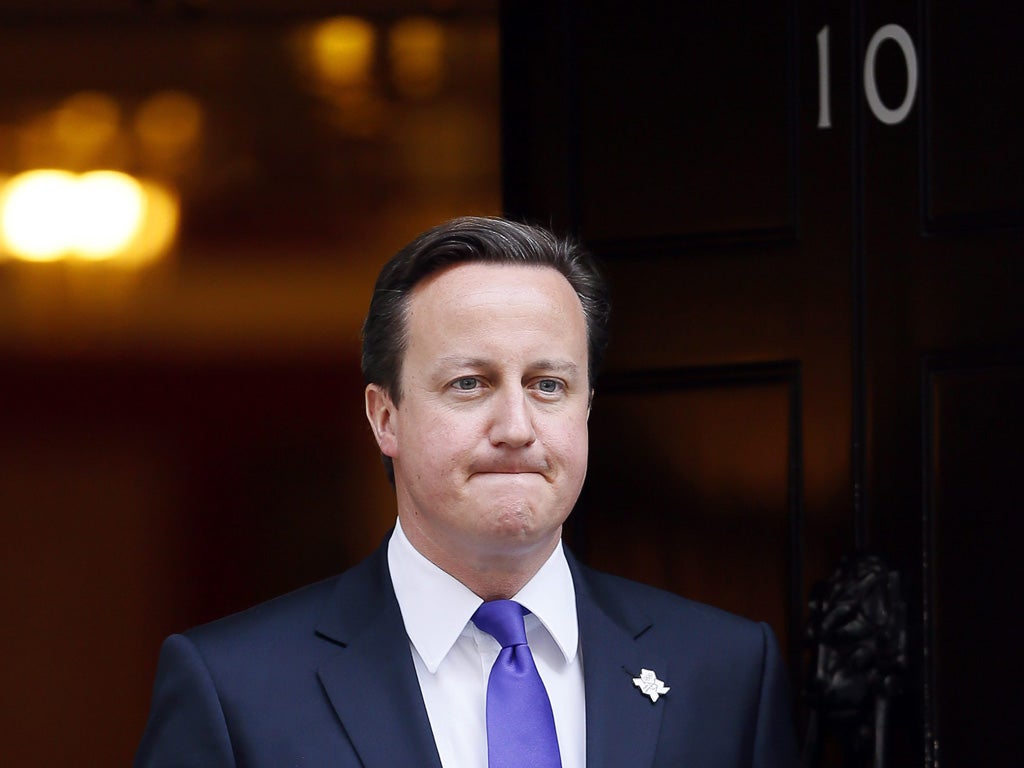Andrew Grice: Cameron must think short-term to end headline horrors
Inside Westminster


"This is a government that's looking at the horizon, not the headlines," David Cameron told Conservative activists in Wales on Thursday. After two weeks of horrible headlines for his Government and party, anyone would prefer the horizon.
Politicians often argue – in public – that they must rise above the day-to-day headlines to take the right long-term decisions for the country. Privately, of course, they fret about the headlines. After a few years as Prime Minister, Tony Blair vowed to worry less about the headlines but would still bark at aides: "I don't care what's on the comment pages; I care what's on the bloody front pages."
As it happens, Mr Cameron believes passionately that his administration is taking some very important long-term decisions – for example, reforming welfare and creating the right conditions for growth by streamlining the planning system and boosting infrastructure spending.
However, many of these measures won't bear fruit for years and so provide little comfort during what is his most difficult period since becoming Prime Minister. The Budget was a presentational disaster; its "granny tax" and "pasty tax" still cause bad headlines; allegations that Conservative Party donors were offered "cash for access" to Downing Street dragged him into a sleaze row and the Government mishandled the threatened strike by petrol tanker drivers. This week, his administration was on the defensive over plans for more internet and email surveillance and "secret courts" to hear sensitive intelligence. Tory ministers were slow to explain their proposals. Nick Clegg responded to the deeply-held concern among Lib Dems about civil liberties by demanding changes to both proposals. He dismayed Tory ministers, who hoped Lib Dem negotiating in public – to "differentiate" the party from the Tories – would stop once the Budget was done and dusted. Clearly, it is here to stay. "It wasn't just for Christmas; it's for the life of this parliament," quipped one Lib Dem.
It would be wrong to describe the mood in Downing Street as one of panic, but it is true to say Team Cameron has been shaken by recent events. Its natural self-confidence has been dented. Inevitably, there are signs of a blame game. Some ministers point the finger at the Number 10 communications team. Yet the most damaging of the spate of unforced errors was surely the government-induced panic at the petrol pumps, which disrupted the daily lives of millions. "People will forget the granny tax and the pasty tax and even the cut in the 50p tax rate," said one Downing Street insider. "The worry is that they'll remember we told them to queue for petrol because of a strike that hadn't happened."
The Government's message was badly delivered – notably by Francis Maude, the Cabinet Office minister who urged people to keep a jerry can in their garage. "Ministers can't blame us if they screw up," said one member of the National Union of Spin Doctors. They do, actually, but it's unfair.
In his speech in Wales, Mr Cameron insisted his Government acted in "the national interest, not the party interest." But in the fuel dispute, the two became blurred. Mired in the cash-for-access controversy, the Tories were desperate to switch the spotlight and seized on the threatened strike to play the union card against Labour. It backfired.
Team Cameron's concern is that the handling of the dispute called into question the Government's competence – a quality that, once lost, can be hard to recover. This is why Mr Cameron has a phobia about U-turns, believing they make a leader look weak and incompetent. He normally looks a natural in his job, something which should be one of his big selling points at the 2015 election. But that would be undermined if he is not seen as strong and competent, so he will want to learn lessons from the past fortnight.
It didn't take long for Mr Cameron's right-wing critics in the media and among Tory MPs to circle – a revealing reminder that his support among them is shallow. Some enemies within even started to dream of his demise, a severe bout of wishful thinking. Critics who believe a right-turn is the solution to every problem will be disappointed. In fact, some Cameroons warn, the hardliners risk driving the Prime Minister deeper into the Lib Dem embrace they so detest.
Labour attacks on the Budget's "tax cuts for millionaires" underline the need for Mr Cameron to answer the charge that the Tories are "out of touch" and the "party of the rich". The lines are not new but are a lot more potent than a couple of weeks ago.
The Cameroons do not buy the thesis that recent events have "retoxified" the Conservatives. Rather, they suspect the party did not win an overall majority in 2010 because they had not fully "detoxified" it. Which is bad news for those who Chris Huhne labelled the Tories' "Tea Party Tendency."
Like Labour, the Tory right hopes these turbulent times will see the tide turn in their favour. Both are being premature. But Mr Cameron needs to steady the ship; this is not a turning point yet, but it could become one.
Join our commenting forum
Join thought-provoking conversations, follow other Independent readers and see their replies
0Comments